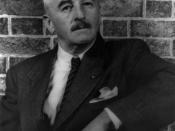The past is sometimes hard for people to put behind them. Their favorite memories and the everyday lifestyle of the time may be hard to let go of for some. These new changes may seem unnecessary for certain reasons. Living in the past can bring certain negative consequences as displayed in Emily Grierson in William Faulkner's short story "A Rose For Emily", and the Mother in Jamaica Kincaid's short story "Girl".
Faulkner believes the south in general has an obsession with the past. Emily Grierson was referred to in the story as a "fallen monument". A monument of southern hospitality and past values. Her house, which was described as "lifting its stubborn and coquettish decay above the cotton wagons and the gasoline pumps--an eyesore among eyesores" emblematically, symbolizes Emily. One example of living in the past is When Emily was young, Colonel Sartoris had remitted her taxes in Jefferson, but generations change within the story, and their values differ.
So the next generation, feeling no "hereditary obligation," attempts to collect these reportedly remitted taxes. He had given his word and according to the traditional view, his word knew no death. It is the events of the past against the present. A Past where everything was done socially and the present where the books do everything. Emily will not accept that times have changed and her and Colonel's verbal agreement is not valid since the Colonel has been dead for ten years. Emily' Father was overprotective of her and mistreated her; unfortunately since Emily wasn't allowed to interact with others it was the only form of love she received. When her father died and left her with nothing, she had nothing to cling on since her father drove away all the men who came by for Emily in the past. She did the only thing she could do and clung onto her father's dead body thinking he never died. His dead body was kept in the house for three days till she was forced to remove it. Faulkner suggests by this that southerners who live in the past are not sane. Just as Emily refused recognize the death of Colonel Sartoris and recognize the tax agreement was not valid, she couldn't acknowledge the death of her father.. After Emily's death the police go upstairs in her house and get into a locked room. They find Homer Barons skeleton lying on the bed and a hair of Emily's on the pillow next to him. This suggests Emily was sleeping with a dead person. Faulkner Conveys that the south hangs onto the past and crazy old people even after they die. A final example of living in the past Faulkner shows is the old men who to Emily's funeral and they dress in their Confederate uniforms and talk about and imagine that they had danced with Emily. The author of this work William Faulkner regards the past as an archive of great images of human effort and integrity, but also as a source of evil. A message about the past Faulkner tries to represent is that when someone submits to the ideals of the past, it results in a form of death. This is why Faulkner contrasted the past with the present era. In "Girl", the story is a letter in which a mother gives to a young woman a detailed list of rules to instruct her in how to act now that she is no longer a child. A difference from a "Rose for Emily" is how the story are presented by the author Jamaica Kincaid lets the reader know bluntly that this Mother is stuck on past ideal, Faulkner Uses metaphors to present the obsession with the past. Some similarities are that both Emily Grierson and the Mother in "Girl" are living in the past. The Role that women play in both stories is also similar. They are viewed as inferior to men, which was generally accepted at the times each story took place. All Emily did was sit in her house all day and not leave to go out on her own. The mother tells her daughter not to become the slut that she knows she is bent on becoming. This is because the mother of the mother told her the same thing and she became a slut. The mother is teaching the girl what she was taught as a young child, how to cook, clean and perform everyday tasks. She is told basically that she will be a slut no matter what. This obviously does not seem like the right way to raise a child. Both authors were able to effectively get the point across that living in the past can have negative consequences





